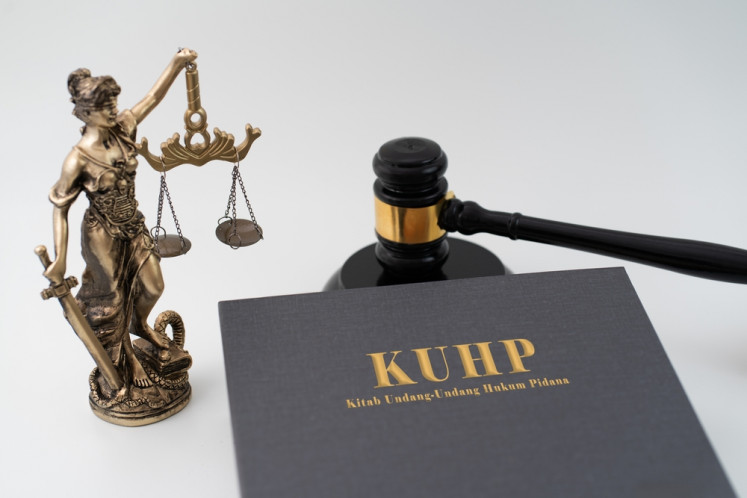Popular Reads
Top Results
Can't find what you're looking for?
View all search resultsPopular Reads
Top Results
Can't find what you're looking for?
View all search resultsDevelopment kept as top priority in Papua policy
Hey mama: President Joko “Jokowi” Widodo, accompanied by First Lady Iriana, greets mama-mama Papua (Papuan women) in Anggi district, Pegunungan Arfak regency, West Papua, on Sunday
Change text size
Gift Premium Articles
to Anyone
Hey mama: President Joko “Jokowi” Widodo, accompanied by First Lady Iriana, greets mama-mama Papua (Papuan women) in Anggi district, Pegunungan Arfak regency, West Papua, on Sunday. It was Jokowi’s first regional visit after his inauguration for his second term.(AFP/Indonesian Presidential Palace)
President Joko “Jokowi” Widodo is making a three-day visit to Papua and West Papua the first trip of his second term, and the first sojourn to the country’s easternmost provinces since unrest broke out in the region in August.
While the President has signalled a willingness for comprehensive dialogue with Papuans, including those who support a referendum on self-determination, observers say that early indications suggest he will focus on developing infrastructure in the region as a continuation of what he did in his first term.
Jokowi left Jakarta on Saturday afternoon and arrived in Sorong, West Papua at around 9 p.m. local time.
On Sunday morning, he flew from Sorong to Manokwari and then took a helicopter to Pegunungan Arfak regency, where he was welcomed by thousands of residents as well as Regent Yosias Saroy.
Jokowi was accompanied on his visit by First Lady Iriana, Public Works and Housing Minister Basuki Hadimuljono, Transportation Minister Budi Karya Sumadi and Home Affairs Minister Tito Karnavian.
In a speech at the Irai soccer field, Jokowi said he was happy that he was able to visit the regency for the first time and spoke about a number of infrastructure projects for the area.
“As the regent and the governor have said, the first [priority] is the road between Manokwari and Pegunungan Arfak that the regent asked to be quickly completed and paved,” he told the crowd according to a release from the Presidential Press Bureau.
The President said the road would help make it easier for residents to sell farm products such as carrots and potatoes in Manokwari.
He added that the regency had a lot of potential as a tourist destination and promised to build an airport to help develop that potential.
“Give me two years to complete an airport here. That will make everything open, residents can go anywhere and an airport is a very important transportation facility so that residents here can become more advanced,” he said.
Jokowi also visited a traditional market in the regency and is scheduled to inaugurate the Holtekamp Bridge in Jayapura, Papua on Monday before leaving the province for Maluku.
Indonesian Institute of Sciences (LIPI) researcher Cahyo Pamungkas, who is part of LIPI’s Papua Studies team, said that while it was still early days, Jokowi’s itinerary and the ministers that accompanied him on the visit were indications that the President would persist with a narrow focus on infrastructure that has yet to prove successful.
“Before his visit to Papua, I had hoped [Jokowi] would display an effort to resolve the racial abuse incident in Surabaya and use the visit to announce a road map on how the government plans to address the political violence and human rights abuses in Papua,” Cahyo told The Jakarta Post on Sunday. “If his only agenda there is about physical infrastructure, that’s unfortunate.”
Intermittent demonstrations and rioting have gripped Papua and West Papua since August, triggered by an incident of racial abuse against Papuan university students in Surabaya, East Java. Most recently, a riot in Wamena on Sept. 23 resulted in 32 dead, most of whom were residents who had moved to the region from outside Papua, raising concerns that communal violence might spread.
“During his visit, Jokowi needs to do a lot more listening, because the [unrest] indicates that [the infrastructure development] that he has done so far has not hit the mark,” Paramadina University political communications expert Hendri Satrio told the Post.
Cahyo echoed Hendri’s comments, saying that besides physical infrastructure, the Jokowi administration should turn its attention to social infrastructure as well, citing his experience visiting several remote regencies in West Papua last year.
“When I went there, I saw many new school buildings and community health centers [Puskesmas]. But there was a shortage of teachers and medical workers,” he said. “If this type of social infrastructure is not developed, then native Papuans will not be able to fully utilize the physical infrastructure, which will only serve to strengthen the dichotomy between natives and non-natives.”
He added that the government’s fixation on infrastructure was an incomplete diagnosis of the ills that plagued the country’s easternmost provinces.
“It seems that Jokowi sees the rioting as an expression of dissatisfaction with the state of development in Papua and West Papua, so his answer is to build more infrastructure,” he said.
“To an extent, that is true, but the government has not addressed the larger problems of discrimination, human rights abuses and violence that cannot be solved by infrastructure.”
The President’s selection of former Jayawijaya regent John Wempi Wetipo as deputy public works and housing minister, the sole native Papuan among Jokowi’s new ministerial and deputy-ministerial appointments, furthered the impression that infrastructure remains the administration’s main priority for the region.
“We’ll see what happens, but indications are that the next five years will not be too different from the past five,” Cahyo said.










